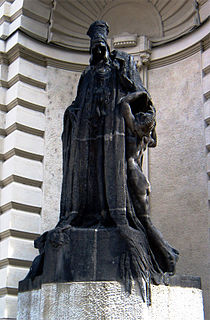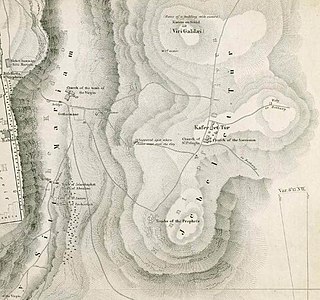Related Research Articles

Judah Loew ben Bezalel, also known as Rabbi Loew, the Maharal of Prague, or simply the Maharal, was an important Talmudic scholar, Jewish mystic, and philosopher who, for most of his life, served as a leading rabbi in the cities of Mikulov in Moravia and Prague in Bohemia.
Chief Rabbi is a title given in several countries to the recognized religious leader of that country's Jewish community, or to a rabbinic leader appointed by the local secular authorities. Since 1911, through a capitulation by Ben-Zion Meir Hai Uziel, Israel has had two chief rabbis, one Ashkenazi and one Sephardi.
Acharonim in Jewish law and history, are the leading rabbis and poskim living from roughly the 16th century to the present, and more specifically since the writing of the Shulchan Aruch in 1563 CE.

Yechezkel ben Yehuda HaLevi Landau was an influential authority in halakha. He is best known for the work Noda Biyhudah, by which title he is also known.

Mikulov is a town in Břeclav District in the South Moravian Region of the Czech Republic. It has about 7,400 inhabitants. The historic centre of Mikulov is well preserved and is protected by law as an urban monument reservation.

Rabbi Gershon Shaul Yom-Tov Lipmann ben Nathan ha-Levi Heller, was a Bohemian rabbi and Talmudist, best known for writing a commentary on the Mishnah called the Tosefet Yom-Tov (1614–1617). Heller was one of the major Talmudic scholars in Prague and in Poland during the "Golden Age" before 1648.
A sofer is a ritual scribe in Judaism.

Rabbi Jonah ben Abraham Gerondi, also known as Jonah of Girona and Rabbeinu Yonah, was a Catalan rabbi and moralist, cousin of Nahmanides. He is most famous for his ethical work The Gates of Repentance.
Bezalel ben Joel Ronsburg was a Bohemian Talmudist and rabbi, dayan and head of the yeshiva in Prague. Zecharias Frankel was one of his pupils.
Eva Bacharach was a Hebraist and rabbinical scholar.

Yochanan Sofer was the Rebbe of the Erlau dynasty, which though not the largest in the number of its adherents is still a significant movement within Haredi Judaism. He was born in Eger (German: Erlau), Hungary, where his father and grandfather served as Grand Rabbis. After surviving the Holocaust, he continued their legacy by founding a yeshiva and a movement in their name, first in Hungary and then a few years later in Jerusalem.
Erlau, is a Haredi dynasty of Hungarian origin, which follows the teachings of the Chasam Sofer and is often considered Hasidic.
Moshe Sofer (II) (1885–1944) was a prominent Orthodox Jewish (Charedi) Rabbi in the early 20th century. He was Dayan of Erlau, Hungary and author of a halachic responsa sefer named Yad Sofer.

The Jewish Cemetery on the Mount of Olives is the oldest and most important Jewish cemetery in Jerusalem. It is approximately five centuries old, having been first leased from the Jerusalem Islamic Waqf in the sixteenth century. The cemetery contains anywhere between 70,000 and 150,000 tombs, including the tombs of famous figures in early modern Jewish history. It is considered to be the largest and holiest Jewish cemetery on earth.
Jonah ben Elijah Landsofer was a Bohemian rabbi and Talmudist. He made a special study of the Masorah and was well versed in the regulations concerning the writing of scrolls of the Law, whence his name "Landsofer." He studied also secular science and Kabbalah, and as a kabbalist he, with Moses Ḥasid, was sent by Abraham Broda to Vienna to engage in a disputation with the Shabbethaians. He died in Prague in 1712.
Abraham ben Ephraim Niederländer, also known as Abraham Sofer and the Sofer of Prague, was a sixteenth-century Jewish-Austrian mathematician.
The Jaffe family is an Ashkenazi Jewish Rabbinic family originally from Dampierre, France. The family descends from the 12th century Tosafist, Elhanan Jaffe of Dampierre. Members of the family have produced numerous famous Rabbis, Court Jews, Talmudic scholars, Scientists, businessmen, academics and politicians, with members in Germany, Austria, Lithuania, Poland, Russia, Great Britain, Italy, Canada, Israel and the United States.

Judah Leib the Elder was a 16th-century Czech rabbi based in Prague, who is of great genealogical significance due to his alleged descent from King David.

Isak Elbogen, was a rabbi from Bohemia. He worked in the synagogue in Smíchov and for almost his entire professional career as a regional rabbi of the Jewish community in Jungbunzlau, then one of the most important in Bohemia.
References
- ↑ "Largest Online Family Tree at geni.com".
- ↑ ben Barukh ben Abraham, Israel (1927). Tzavat Geonei Yisroel: Part 2 (PDF). Hebrewbooks.org.
- 1 2
 Singer, Isidore; et al., eds. (1901–1906). "Landsofer (Landschreiber), Jonah ben Elijah". The Jewish Encyclopedia . New York: Funk & Wagnalls.
Singer, Isidore; et al., eds. (1901–1906). "Landsofer (Landschreiber), Jonah ben Elijah". The Jewish Encyclopedia . New York: Funk & Wagnalls. - ↑ "Loeb Family Tree".
- ↑ Stern, Yechiel Michel (1996). Gedolei Hadoros. Minchas Israel.
- ↑ Lewis, Binny. "Bomzer Family Website".